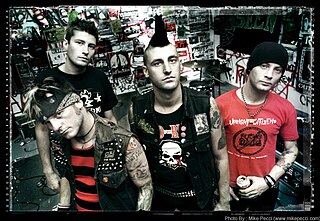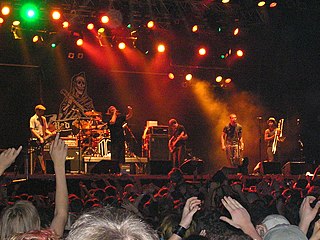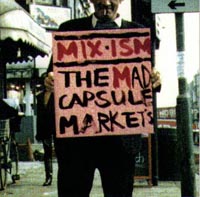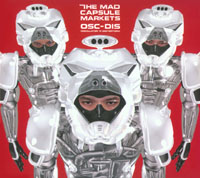
The Unseen is an American punk rock band that was formed in 1993 in Hingham, Massachusetts. One of the more prominent bands to revive street punk, The Unseen was originally called The Extinct.

The Mad Caddies is an American ska punk band from Solvang, California. The band formed in 1995 and has released seven full-length albums, one live album, and two EPs. To date, Mad Caddies have sold over 500,000 albums worldwide.

Balzac is a Japanese punk rock band formed in 1992 in Kyoto. The band was founded by singer and songwriter Hirosuke Nishiyama, who has remained the only constant member of the band since its creation. Since the beginning, Balzac was highly influenced by the sound and image of the American horror punk band Misfits and, especially during the very early years, Glenn Danzig's Samhain, adopting and combining the musical and visual style of both bands to create their own. Balzac's lyrics, though not always serious in tone, often deal with themes of darkness, loneliness and fear.

Humanity is the debut album from Japanese hardcore punk group The Mad Capsule Markets. They later re-released the album in 1996, and this was the only full album that guitarist Minoru Kojima played on. This album contains the original version of the songs "San Byoukan no Jisatsu" and "Life Game", which both appear in censored form on the album "P.O.P". The original version of "San Byoukan no Jisatsu" contains an extra line in the chorus about jumping off a building. It was never made certain why the line was removed on "P.O.P", but it was speculated that the song was linked to Japanese teen suicide, and therefore censored on "P.O.P" and has been totally silenced on the re-release of "Humanity" and releases thereafter. The band or record company would later erase any further reference of it from on the insert for the re-release of "Humanity" also, as the word "Jisatsu" (suicide) on the track list has been scribbled out.

Mix-ism is the fourth album from The Mad Capsule Markets. Mix-ism earned The Mad Capsule Markets their first high rated album on the charts and featured the band experimenting and branching out, showing a more melodious sound overall. The album has a very dark feel to it compared to other releases, mainly coming from the lyrical themes featured. The album was also recorded in England.
Takeshi Ueda is the bassist, programmer, additional vocalist and songwriter for The Mad Capsule Markets. He is often known for his unique way of bass guitar playing, and ever changing haircuts.
Hiroshi Kyono is the former vocalist for The Mad Capsule Markets.

Digidogheadlock is the seventh album by Japanese band The Mad Capsule Markets and their first to receive a European release. The album explored the sound that would later be used on their following album, Osc-Dis. TORUxxx stepped in on guitar for this album, although Takeshi Ueda recorded guitar on the track "Asphalt Beach". This album gained the band recognition by Digital Hardcore Recordings founder and Atari Teenage Riot frontman Alec Empire, who remixed two tracks and invited the band to tour with ATR. The album was released two years before the breakthrough album Osc-Dis, but there was little international interest at the time. The song "3:31" is a reference to vocalist Kyono's birthdate.
Motokatsu Miyagami is a Japanese musician, best known as drummer of the band The Mad Capsule Markets from 1990 until their disbandment in 2006. He is currently the drummer for Ace of Spades and Gastunk.

Osc-Dis or Oscillator in Distortion is the eighth album by Japanese band The Mad Capsule Markets. It was released in Japan in 1999 and released outside Japan in 2001. Osc-Dis was the band's breakthrough album and finally got them recognized overseas, with the single "Pulse". The album mixes industrial metal, industrial rock and punk rock with various kinds of electronic music. It was more melodic than their previous album and included elements of pop punk. There are vocal contributions from Hirosuke from Balzac, Yamada from Geronimo, and Katsya from NND. This album also saw the birth of the band's mascots The White Crusher and The Cyborn.

010 is the ninth studio album by Japanese band The Mad Capsule Markets. It was released in Japan in 2001 and in the United Kingdom in 2003. The album was much more experimental than the band's previous two albums. It includes a cover of the song "Wardance" by Killing Joke.
Ai Ishigaki was the guitarist for The Mad Capsule Markets from 1990 to 1996. He got the job as support guitarist after being a roadie for MCM in the Berrie days. Ishigaki debuted on their Thrash-Punk album P.O.P and later became the more well known guitarist because he could bring a softer, more experimental acoustic element to their later releases. Ishigaki left the band in 1996, it was stated that the harder direction on 4 Plugs may have been why. After leaving, Ishigaki worked on solo material, formed Blade with actor Shinji Takeda, and contributed guitar to other bands, including Tomoyasu Hotei who was an ex-member of Japanese rock group Boøwy.
Minoru Kojima is a Japanese guitarist, who was the original guitarist for the experimental punk band The Mad Capsule Markets. He is also known as Scene or Shin Murohime, which is apparently a conglomeration of characters from the names of different Boøwy members. He started The Mad Capsule Markets in 1985, with vocalist Hiroshi Kyono, in an attempt to create "loud, punk music" after becoming "bored" with music played on television and radio. After the release of Mad's Humanity, Minoru left the band and was replaced by "support guitarist" Ai Ishigaki. In 1991 Minoru started Die in Cries and in 1994 became a member of The Bloody Imitation Society. Over the years Minoru worked with more bands and even went solo for a short time before returning to Mad to play on "Good Day" from their album 010 and playing on their "Cistm Konfliqt" tour.

Hisashi Tonomura, better known by his stage name HISASHI, is a Japanese musician best known as the lead guitarist of the rock band Glay. He is particularly associated with the brand Tokai, designing a series of personal signature guitars, based on their Talbo model.
Wisdom in Chains is an American hardcore punk band based out of Northeastern Pennsylvania. The band's name is taken from the lyrics of a song by the New York hardcore band Killing Time. "Wisdom", from Killing Time's 1989 debut album, Brightside, opens with, "Wisdom in chains, unlocked too late".

The Party AUDIO STACK is the 20th album by Japanese jazz fusion band Casiopea. In addition, the video was released simultaneously as The Party VISUAL STACK on June 25, 1990, with LaserDisc and VHS. Also, when we sent the application tickets attached to "AUDIO STACK" and "VISUAL STACK", we got The Party EXTRA STACK by lottery.
This album marked the joining of Yoshihiro Naruse (bass) and Masaaki Hiyama (drums) to the band. This is also Casiopea's 20th overall album.

Jealousy is an EP by Japanese heavy metal band Loudness. It was released in May 1988 only in Japan, a market that the band felt to have neglected in favour of American audiences. It would also mark the final recording with the classic line-up, until Spiritual Canoe in 2001. Singer Minoru Niihara left the band after the end of the domestic tour promoting this release. The song "Long Distance Love" would later be reworked for the On the Prowl album, with vocals by American singer Mike Vescera.
Masami Tsuchiya is a Japanese singer-songwriter, musician and record producer. He rose to prominence in the late 1970s as lead vocalist and guitarist of the rock band Ippu-Do. Following their disbandment in 1984, Tsuchiya focused on his solo career and formed several short-lived bands with well-known musicians. He has also participated in various collaborations and produced recordings for acts such as Glay, Blankey Jet City, and The Willard.
Gastunk is an influential Japanese rock band, first active from 1983 to 1988. Initially a hardcore punk band, guitarist Tatsu later recalled that when Gastunk made their major label debut they were dubbed heavy metal by the media. They reunited for one-off concerts in 1999 and 2006, before fully restarting activities in 2010.

Who Killed Idol? is the third studio album by Japanese idol group BiS, released on March 5, 2014. It is the last studio album released by the group before they disbanded in July 2014, and the only studio album to feature members First Summer Uika, Tentenko, Saki Kamiya and Megumi Koshouji. The album was released following a period of multiple changes in the BiS lineup, resulting in some tracks featuring members that were no longer part of the group by the time the album was released. The album continues the basic style of their previous albums, but shows more variety in the various styles of rock and pop featured in the tracks: "STUPiG" showcases a digital hardcore sound, "Hi" takes a step into upbeat punk rock, and "MURA-MURA" ventures into SKA-core. The pattern of including a cover track is continued, with "Primal" by The Yellow Monkey being included as the final track. The original version of this track also happened to be the last song The Yellow Monkey released before they disbanded, adding to its significance in the album.











